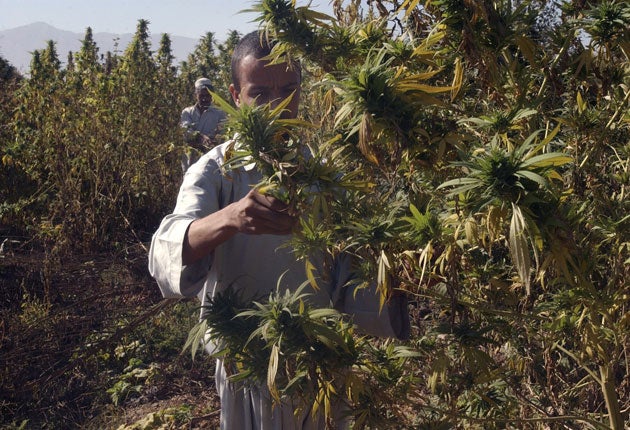Afghan farmers reap cannabis harvest worth £61m
New UN report shows corruption is lubricating Afghanistan's latest lucrative drugs industry

Your support helps us to tell the story
From reproductive rights to climate change to Big Tech, The Independent is on the ground when the story is developing. Whether it's investigating the financials of Elon Musk's pro-Trump PAC or producing our latest documentary, 'The A Word', which shines a light on the American women fighting for reproductive rights, we know how important it is to parse out the facts from the messaging.
At such a critical moment in US history, we need reporters on the ground. Your donation allows us to keep sending journalists to speak to both sides of the story.
The Independent is trusted by Americans across the entire political spectrum. And unlike many other quality news outlets, we choose not to lock Americans out of our reporting and analysis with paywalls. We believe quality journalism should be available to everyone, paid for by those who can afford it.
Your support makes all the difference.Afghanistan, already the world's top opium supplier, is now the world's biggest producer of cannabis, according to United Nations drug experts.
There is large-scale cultivation of the drug in half of the country, resulting in 3,500 tons of hashish worth an estimated £61m annually, according to the first assessment of cannabis in Afghanistan by the UN Office on Drugs and Crime. It warns that the threat from the drug needs to be dealt with to deny the Taliban the millions they make in protection taxes paid by farmers and drug smugglers.
The focus on opium has resulted in cannabis being overlooked, according to Antonio Maria Costa, executive director of UNODC. "A concentration of cultivation in the southern part of Afghanistan shows that the Taliban and those insurgents that control the southern parts of the country are not only funding themselves by trafficking opium but also by trafficking cannabis. It's the same area."
Sporadic government crackdowns have merely resulted in a shift in production to the south of the country, with most cannabis now grown in regions where the insurgency is at its strongest. There are close links with the heroin trade, with more than 67 per cent of cannabis farmers also growing opium, according to the report, which is based on a survey of more than 1,600 villages across the country. UN experts estimate that 60,000 households are now growing cannabis.
Although cheaper than opium, cannabis can potentially earn a farmer more because it yields twice the quantity of drug per hectare and is cheaper and less labour-intensive to cultivate. Farmers can earn £2,173 per hectare – more than the £1,304 they get from opium. But since cannabis has a short shelf life and is grown only in the summer, when there is less water available, they continue to cultivate opium as their main drug crop.
A British-backed paramilitary unit is hunting down Afghan drug lords as part of a new strategy against the drug trade. Four helicopters have already been provided by Britain for airborne assault missions by the Afghan Special Narcotics Force, with another two being made available to an Air Interdiction Unit this year. Targets are being drawn up by an Interagency Operations Co-ordination Centre in Kabul, led by officers from Britain's Serious Organised Crime Agency and the US Drug Enforcement Administration. But efforts are hampered by high levels of corruption and drug use among police, with 68 per cent testing positive for cannabis.
Slamming the Afghan government as "pretty rotten", Mr Costa added: "Corruption has been a major lubricant of the very prosperous drug industry... it's throughout the system."
Join our commenting forum
Join thought-provoking conversations, follow other Independent readers and see their replies
28Comments